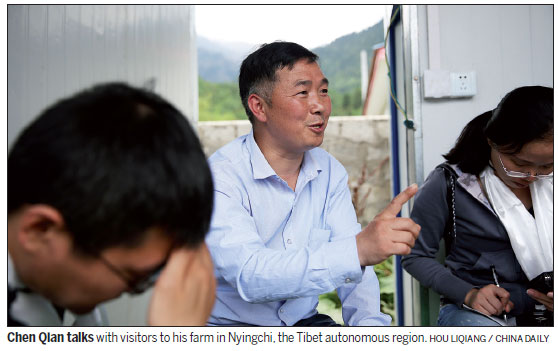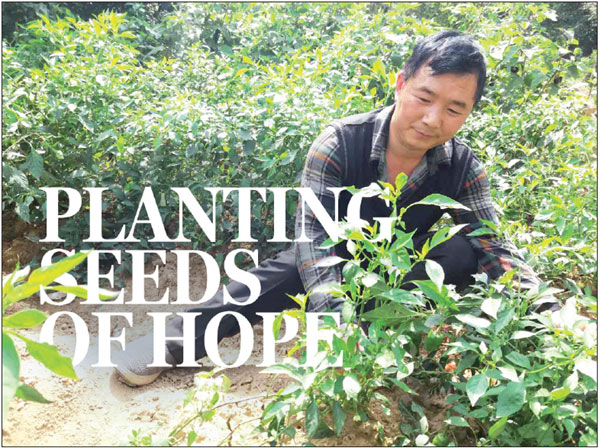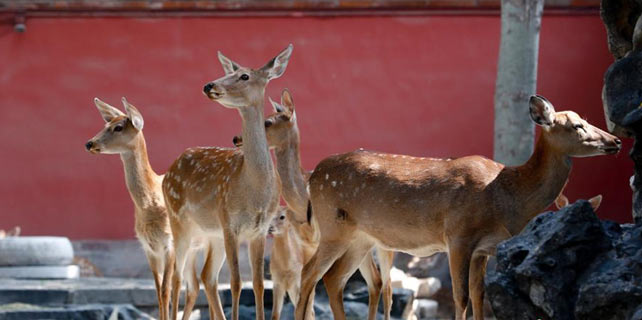Planting seeds of hope
|
Chen Qian works at his farm. Provided To China Daily |
Farming expert moved to Tibet to help improve the region's agriculture
Before the age of 30, Chen Qian was a restless man. After graduating from college in 1992, he landed a job as a division head at a township government - a secure, lifelong position that is often known as an "iron rice bowl" in China.
Yet just three years later, the native of Hubei province had quit to start work at a senior vocational high school in Shijiazhuang, Hebei province, instead.
It was here that Chen, a member of the Tujia ethnic group, first met a Tibetan and became fascinated by what he described as their simple ways and goodness.
"An idea occurred to me then - go to Tibet and have a look," he recalled.
Chen soon got his chance. In 2000, an opportunity arose for him to travel to the autonomous region.
It was standard practice at that time for Tibetan students to return home after they had completed their college entrance exams, but the school was short one chaperon that year.
Chen volunteered, not knowing the trip would change his life forever.

After escorting the student, Chonyi Jampel, back home to Maldrogungkar county, he went to visit Nyanrong county in Nagchu prefecture.
Another of his students, Norgyel Wangchug, had suggested Nyingchi in southeastern Tibet would be the perfect place to settle down, because of the favorable weather conditions.
Chen, who majored in agriculture, took one look at the underdeveloped highland and thought it would be the perfect place to practice his expertise.
He had long dreamed of making his mark on the world and decided then that this would be the ideal setting.
So he quit his job at the school and even changed his name to Chen Zhen, a homophone for "come true" in Chinese, in the hope of achieving his ambition.
For five years from 2003, Chen worked as an agricultural technician, developing a cultivation technique that greatly increased yields and led to an average price reduction of 5 yuan (78 cents) per kilogram for vegetables in Metog county in Nyingchi. He also helped increase the county's rice yield until it surpassed 7,500 kilograms per hectare.
In fact, he became so engrossed in his work that he didn't return to Hubei province until 2008.
By 2011, Chen had become more ambitious. He sought to develop greenhouse cultivation in Nyingchi, so that vegetables could be grown locally instead of being brought in from elsewhere.
With more than 10 years of experience in vegetable planting on the plateau under his belt, Chen soon developed a type of greenhouse that was suitable for the local weather conditions. With the government's help, he built 80 such greenhouses on a farm of more than 13 hectares in Manling county last year.
Gan Lihua, head of Manling township, spoke highly of Chen's efforts.
"In winter, the price of green vegetables used to be up to 40 yuan (61 cents) per kilogram," she said.
"With the greenhouse farm, local people can now get much cheaper vegetables of a higher quality."
Ragba village, where the farm is located, stands to earn 19,500 yuan per hectare of land as a year-end bonus, Gan added - far more than could be earned from crop planting alone.
In addition, watermelons from the farm are now being sold in the regional capital of Lhasa, more than 400 kilometers away.
Luosang Drolma, 31, started working on the farm in 2005 and as an industrious employee, she soon won Chen's heart.
"One time I was picking watermelons in the greenhouse and she carried all of them, on her own, to a buyer's truck waiting outside," he recalled.
"That's no easy task, even for a man, but she kept working for almost a whole day without even stopping for lunch."
The two got married in 2006, though life was still a struggle.
"He was poor. Meat was kind of a luxury that we only ate once every two or three months," Luosang Drolma said.
Yet even when they had little themselves, Chen has always been kindhearted, his wife said.
Last year, during the Spring Festival holiday, he donated vegetables and other goods worth more than 5,000 yuan to a nearby temple.
Chen plans to teach his greenhouse-cultivation techniques to others so that they can find similar success, too.
Yateng from Ragba has been working on Chen's farm for a year. She said she has learned a lot in that time.
"I am very confident that I will be able to build my own greenhouse to plant vegetables after working here for several years," the 50-year-old said.
Chen also spent about nine years researching Tibet's religious history and recently finished a 1.47-million-word book on the topic, to be published soon.
He said he hopes his book, which is written in a simple and easy-to-understand style, will better inform the many tourists who fail to learn much about Tibetan culture when visiting on a short tour.
Chen and his wife are one of 2,374 mixed-ethnicity couples in Nyingchi prefecture, according to the local government, who make up about 4 percent of the area's total households.
Contact the writers at houliqiang@chinadaily.com.cn










